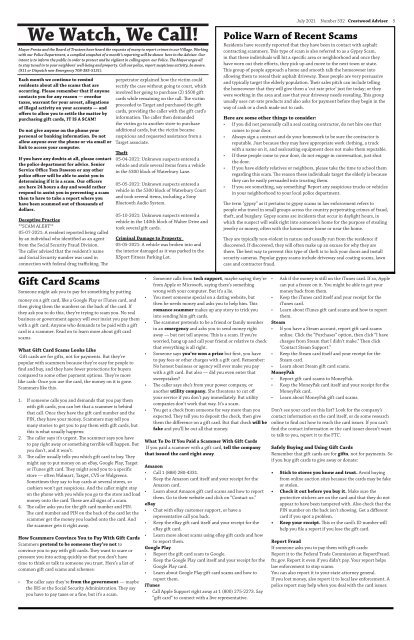You also want an ePaper? Increase the reach of your titles
YUMPU automatically turns print PDFs into web optimized ePapers that Google loves.
We Watch, We Call!<br />
Mayor Presta and the Board of Trustees have heard the requests of many to report crimes in our Village. Working<br />
with our Police Department, a compiled snapshot of a month’s reporting will be shown here in the Adviser. Our<br />
intent is to inform the public in order to protect and be vigilant in calling upon our Police. The Mayor urges all<br />
to stay tuned in to your neighbors’ well-being and property. Call our police, report suspicious activity, be aware.<br />
(911 or Dispatch non-Emergency 708-385-5131).<br />
Each month we continue to remind<br />
residents about all the scams that are<br />
occurring. Please remember that if anyone<br />
contacts you for any reason — overdue<br />
taxes, warrant for your arrest, allegations<br />
of illegal activity on your accounts — and<br />
offers to allow you to settle the matter by<br />
purchasing gift cards, IT IS A SCAM!<br />
Do not give anyone on the phone your<br />
personal or banking information. Do not<br />
allow anyone over the phone or via email or<br />
link to access your computer.<br />
If you have any doubts at all, please contact<br />
the police department for advice. Senior<br />
Service Office Tom Dawson or any other<br />
police officer will be able to assist you in<br />
determining if it is a scam. Our officers<br />
are here 24 hours a day and would rather<br />
respond to assist you in preventing a scam<br />
then to have to take a report where you<br />
have been scammed out of thousands of<br />
dollars.<br />
Deceptive Practice<br />
**SCAM ALERT**<br />
05-07-<strong>2021</strong>: A resident reported being called<br />
by an individual who identified as an agent<br />
from the Social Security Fraud Division.<br />
The caller advised that the resident’s name<br />
and Social Security number was used in<br />
connection with federal drug trafficking. The<br />
perpetrator explained how the victim could<br />
rectify the case without going to court, which<br />
involved her going to purchase (2) $500 gift<br />
cards while remaining on the call. The victim<br />
proceeded to Target and purchased the gift<br />
cards, providing the caller with the gift card’s<br />
information. The caller then demanded<br />
the victim go to another store to purchase<br />
additional cards, but the victim became<br />
suspicious and requested assistance from a<br />
Target associate.<br />
Theft<br />
05-04-<strong>2021</strong>: Unknown suspects entered a<br />
vehicle and stole several items from a vehicle<br />
in the 5300 block of Waterbury Lane.<br />
05-05-<strong>2021</strong>: Unknown suspects entered a<br />
vehicle in the 5300 block of Waterbury Court<br />
and took several items, including a Sony<br />
Bluetooth Audio System.<br />
05-10-<strong>2021</strong>: Unknown suspects entered a<br />
vehicle in the 140th block of Walter Drive and<br />
took several gift cards.<br />
Criminal Damage to Property<br />
05-05-<strong>2021</strong>: A vehicle was broken into and<br />
the interior damaged as it was parked in the<br />
XSport Fitness Parking Lot.<br />
<strong>July</strong> <strong>2021</strong> Number 532 Crestwood Adviser 5<br />
Police Warn of Recent Scams<br />
Residents have recently reported that they have been in contact with asphalt<br />
contracting scammers. This type of scam is also referred to as a Gypsy Scam,<br />
in that these individuals will hit a specific area or neighborhood and once they<br />
have worn out their efforts, they pick up and move to the next town or state.<br />
This group of people approach a home and smooth talk the homeowner into<br />
allowing them to reseal their asphalt driveway. These people are very persuasive<br />
and typically target the elderly population. Their sales pitch can include telling<br />
the homeowner that they will give them a ‘cut rate price’ just for today; or they<br />
were working in the area and saw that your driveway needs resealing. This group<br />
usually uses cut-rate products and also asks for payment before they begin in the<br />
way of cash or a check made out to cash.<br />
Here are some other things to consider:<br />
• If you did not personally call a seal coating contractor, do not hire one that<br />
comes to your door.<br />
• Always sign a contract and do your homework to be sure the contractor is<br />
reputable. Just because they may have appropriate work clothing, a truck<br />
with a name on it, and sealcoating equipment does not make them reputable.<br />
• If these people come to your door, do not engage in conversation, just shut<br />
the door.<br />
• If you have elderly relatives or neighbors, please take the time to school them<br />
regarding this scam. The reason these individuals target the elderly is because<br />
they can be easily persuaded into trusting them.<br />
• If you see something, say something! Report any suspicious trucks or vehicles<br />
in your neighborhood to your local police department.<br />
The term “gypsy” as it pertains to gypsy scams in law enforcement refers to<br />
people who travel in small groups across the country perpetrating crimes of fraud,<br />
theft, and burglary. Gypsy scams are incidents that occur in daylight hours, in<br />
which the suspect will walk right into someone’s home for the purpose of stealing<br />
jewelry or money, often with the homeowner home or near the home.<br />
They are typically non-violent in nature and usually run from the residence if<br />
discovered. If discovered, they will often make up an excuse for why they are<br />
there. The best way to prevent this type of theft is to lock your doors and install<br />
security cameras. Popular gypsy scams include driveway seal coating scams, lawn<br />
care and contractor fraud.<br />
Gift Card Scams<br />
Someone might ask you to pay for something by putting<br />
money on a gift card, like a Google Play or iTunes card, and<br />
then giving them the numbers on the back of the card. If<br />
they ask you to do this, they’re trying to scam you. No real<br />
business or government agency will ever insist you pay them<br />
with a gift card. Anyone who demands to be paid with a gift<br />
card is a scammer. Read on to learn more about gift card<br />
scams.<br />
What Gift Card Scams Looks Like<br />
Gift cards are for gifts, not for payments. But they’re<br />
popular with scammers because they’re easy for people to<br />
find and buy, and they have fewer protections for buyers<br />
compared to some other payment options. They’re more<br />
like cash: Once you use the card, the money on it is gone.<br />
Scammers like this.<br />
1. If someone calls you and demands that you pay them<br />
with gift cards, you can bet that a scammer is behind<br />
that call. Once they have the gift card number and the<br />
PIN, they have your money. Scammers may tell you<br />
many stories to get you to pay them with gift cards, but<br />
this is what usually happens:<br />
2. The caller says it’s urgent. The scammer says you have<br />
to pay right away or something terrible will happen. But<br />
you don’t, and it won’t.<br />
3. The caller usually tells you which gift card to buy. They<br />
might say to put money on an eBay, Google Play, Target<br />
or iTunes gift card. They might send you to a specific<br />
store — often Walmart, Target, CVS or Walgreens.<br />
Sometimes they say to buy cards at several stores, so<br />
cashiers won’t get suspicious. And the caller might stay<br />
on the phone with you while you go to the store and load<br />
money onto the card. These are all signs of a scam.<br />
4. The caller asks you for the gift card number and PIN.<br />
The card number and PIN on the back of the card let the<br />
scammer get the money you loaded onto the card. And<br />
the scammer gets it right away.<br />
How Scammers Convince You to Pay With Gift Cards<br />
Scammers pretend to be someone they’re not to<br />
convince you to pay with gift cards. They want to scare or<br />
pressure you into acting quickly so that you don’t have<br />
time to think or talk to someone you trust. Here’s a list of<br />
common gift card scams and schemes:<br />
• The caller says they’re from the government — maybe<br />
the IRS or the Social Security Administration. They say<br />
you have to pay taxes or a fine, but it’s a scam.<br />
• Someone calls from tech support, maybe saying they’re<br />
from Apple or Microsoft, saying there’s something<br />
wrong with your computer. But it’s a lie.<br />
• You meet someone special on a dating website, but<br />
then he needs money and asks you to help him. This<br />
romance scammer makes up any story to trick you<br />
into sending him gift cards.<br />
• The scammer pretends to be a friend or family member<br />
in an emergency and asks you to send money right<br />
away — but not tell anyone. This is a scam. If you’re<br />
worried, hang up and call your friend or relative to check<br />
that everything is all right.<br />
• Someone says you’ve won a prize but first, you have<br />
to pay fees or other charges with a gift card. Remember:<br />
No honest business or agency will ever make you pay<br />
with a gift card. But also — did you even enter that<br />
sweepstakes?<br />
• The caller says she’s from your power company, or<br />
another utility company. She threatens to cut off<br />
your service if you don’t pay immediately. But utility<br />
companies don’t work that way. It’s a scam.<br />
• You get a check from someone for way more than you<br />
expected. They tell you to deposit the check, then give<br />
them the difference on a gift card. But that check will be<br />
fake and you’ll be out all that money.<br />
What To Do If You Paid a Scammer With Gift Cards<br />
If you paid a scammer with a gift card, tell the company<br />
that issued the card right away.<br />
Amazon<br />
• Call 1 (888) 280-4331.<br />
• Keep the Amazon card itself and your receipt for the<br />
Amazon card.<br />
• Learn about Amazon gift card scams and how to report<br />
them. Go to their website and click on “Contact us.”<br />
eBay<br />
• Chat with eBay customer support, or have a<br />
representative call you back.<br />
• Keep the eBay gift card itself and your receipt for the<br />
eBay gift card.<br />
• Learn more about scams using eBay gift cards and how<br />
to report them.<br />
Google Play<br />
• Report the gift card scam to Google.<br />
• Keep the Google Play card itself and your receipt for the<br />
Google Play card.<br />
• Learn about Google Play gift card scams and how to<br />
report them.<br />
iTunes<br />
• Call Apple Support right away at 1 (800) 275-2273. Say<br />
“gift card” to connect with a live representative.<br />
• Ask if the money is still on the iTunes card. If so, Apple<br />
can put a freeze on it. You might be able to get your<br />
money back from them.<br />
• Keep the iTunes card itself and your receipt for the<br />
iTunes card.<br />
• Learn about iTunes gift card scams and how to report<br />
them.<br />
Steam<br />
• If you have a Steam account, report gift card scams<br />
online. Click the “Purchases” option, then click “I have<br />
charges from Steam that I didn’t make.” Then click<br />
“Contact Steam Support.”<br />
• Keep the Steam card itself and your receipt for the<br />
Steam card.<br />
• Learn about Steam gift card scams.<br />
MoneyPak<br />
• Report gift card scams to MoneyPak.<br />
• Keep the MoneyPak card itself and your receipt for the<br />
MoneyPak card.<br />
• Learn about MoneyPak gift card scams.<br />
Don’t see your card on this list? Look for the company’s<br />
contact information on the card itself, or do some research<br />
online to find out how to reach the card issuer. If you can’t<br />
find the contact information or the card issuer doesn’t want<br />
to talk to you, report it to the FTC.<br />
Safely Buying and Using Gift Cards<br />
Remember that gift cards are for gifts, not for payments. So<br />
if you buy gift cards to give away or donate:<br />
• Stick to stores you know and trust. Avoid buying<br />
from online auction sites because the cards may be fake<br />
or stolen.<br />
• Check it out before you buy it. Make sure the<br />
protective stickers are on the card and that they do not<br />
appear to have been tampered with. Also check that the<br />
PIN number on the back isn’t showing. Get a different<br />
card if you spot a problem.<br />
• Keep your receipt. This or the card’s ID number will<br />
help you file a report if you lose the gift card.<br />
Report Fraud<br />
If someone asks you to pay them with gift cards:<br />
Report it to the Federal Trade Commission at ReportFraud.<br />
ftc.gov. Report it even if you didn’t pay. Your report helps<br />
law enforcement to stop scams.<br />
You can also report it to your state attorney general.<br />
If you lost money, also report it to local law enforcement. A<br />
police report may help when you deal with the card issuer.


















